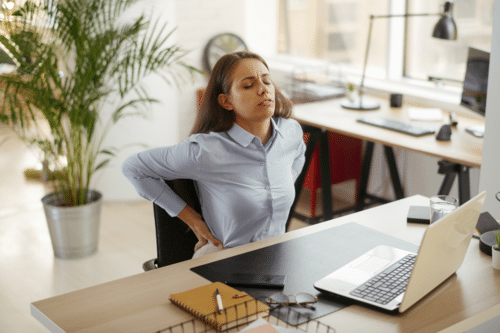
Causes can include an injury such as a strain or sprain as well as specific problems such as slipped disc (where cartilage presses on a nerve) or sciatica which involves irritation of the nerve that runs from the pelvis to the feet. Pain in the lower back (lumbago) is particularly common and can be felt anywhere along the spine from the neck down to the hips.
In the workplace, the likelihood of experiencing musculoskeletal problems is increased if you are lifting heavy loads, carrying out repetitive physical tasks, doing a lot of long distance driving or driving over rough ground, particularly if the seat is not properly adjusted. For those who work at a desk, poor posture such as stooping, bending or crouching and remaining in one position for long periods can also lead to problems. Often though, it isn’t possible to identify the root cause and doctors call this ‘non-specific’ back pain.
Fortunately, in most cases, back pain is rarely due to a serious disease and it normally improves within a few days. There is a wide range of things you can do to help prevent and manage back pain. In the past, people were told to rest and lie down for extended periods. Modern advice from professionals however tells us that exercise is far more beneficial than inactivity and can go a long way to relieve and prevent symptoms. For most people, lying in bed is likely to make any pain worse.
As always, prevention is better than cure, so here are some top tips to help you keep your back in tip-top condition.
- Exercise your back regularly – walking, cycling and swimming (especially back stoke)
- Try to maintain a healthy diet and lifestyle
- Learn to lift heavy objects using the correct lifting technique. Always bend your knees and hips, not your back
- Carry larger loads in a comfortable rucksack using both shoulder straps and avoid sling bags
- Maintain good posture – avoid slumping in your chair, hunching over a desk, or walking with your shoulders hunched
- Try to take a short break – about every 30 minutes or so – from sitting
- Quit smoking. Smoking can reduce the blood supply to the discs between the vertebrae, and lead to disc-degeneration
- Make a real effort to lose any excess weight
- Check your bed provides the correct support and comfort for your weight and build, not just firmness.
- Learn relaxation techniques to help manage stress. Stress can be a major cause of back pain.
Other advice from health professionals includes taking part in activities such as Yoga and Pilates. Hot or cold compression packs can provide short term relief and can be bought from your local chemist. Alternatively, a hot water bottle or even a bag of frozen vegetables wrapped in a cloth will work just as well!
If the pain doesn’t start to improve within a few days, gets more severe or you feel you are struggling to cope, then you should seek help from a chiropractor, physiotherapist or other specialist. Don’t forget, with Medicash you don’t need a GP referral to access these therapists.
Sources
HSE (Health and Safety Executive)
Backcare.org.uk
NHS Choices
